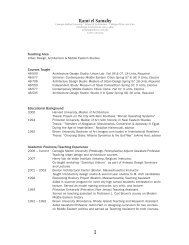Course Descriptions, Pittsburgh (PDF) - Carnegie Mellon University
Course Descriptions, Pittsburgh (PDF) - Carnegie Mellon University
Course Descriptions, Pittsburgh (PDF) - Carnegie Mellon University
You also want an ePaper? Increase the reach of your titles
YUMPU automatically turns print PDFs into web optimized ePapers that Google loves.
NEW<br />
PAYMENT AND CANCELLATION POLICIES<br />
Payment and fee waiver information for all classes are due immediately after registration is confirmed. Your spot will be<br />
reserved only after payment is received.<br />
The cancellation fee is $25. If you must cancel after paying for a class, you will receive a refund (less the $25 cancellation<br />
fee) if you cancel by 4:00 p.m. on the Friday two weeks before the scheduled workshop. After that time, there will be NO<br />
refunds.<br />
For students registering using paper forms, C-MITES mails one acceptance letter. After you have paid, you do not receive<br />
a confirmation. Your cancelled check is your receipt. Students who register online receive a confirmation email. You may<br />
check the online system at any time to view your classes.<br />
More detailed information about the payment and cancellation policies can be found on the Weekend<br />
Workshops FAQs page on our website.<br />
3-D Laser Scanning of Bridges<br />
Build a model of a bridge and use a laser scanner from the Robotics<br />
Institute at <strong>Carnegie</strong> <strong>Mellon</strong> to take 3-dimensional measurements<br />
of your bridge. Use a weight to damage the bridge, simulating<br />
an earthquake, a truck running into the bridge, or the bridge<br />
decaying over time. Then take a second scan of your bridge. Use<br />
specialized software to determine the changes in the scans. Learn<br />
how civil engineers and architects use this type of information<br />
in their work. Class meets from 9 a.m. to 3 p.m. Instructors: Dr.<br />
Daniel Huber, <strong>Carnegie</strong> <strong>Mellon</strong> Robotics Institute, and Dr. Burcu<br />
Akinci, Civil and Environmental Engineering. Grades 7-9.<br />
Ace the Keystone Exam<br />
Do you want an awesome score on your Keystone Literature exam,<br />
or an “A” in every future literature class? Using modern references<br />
(such as well-known movie and television show scenes) in<br />
conjunction with short stories and novel segments, we will make<br />
understanding all those important literary elements fun! Warning:<br />
this class may cause you to perpetually over-analyze movies and<br />
television shows, thus ruining your ability to mindlessly enjoy<br />
them. Grades 7-10.<br />
Action-Packed Engineering<br />
Use simple building materials to learn big ideas in physics. Use<br />
your imagination to create a product that will solve a particular<br />
challenge. Design, build and test a shock-absorbing landing system<br />
for a spacecraft that will protect two astronauts. Use wind<br />
energy to power a car to a finish line. Design bridges that can support<br />
a weight. Solve real everyday problems, think critically, and<br />
communicate with others. Please note: Students will use marshmallows,<br />
life-savers and gum drops along with other “non-edible”<br />
construction materials. Grades 1-2.<br />
Advanced Creative Writing<br />
Write a commercial, practice the art of persuasion, develop dialogue<br />
and create cartoon captions. Polish your writing skills, discuss<br />
idiomatic and figurative language and explore the messages<br />
that words send. Grades 5-7.<br />
Algebra Aces<br />
Use balance scales to compare weights of objects. Create lunch baskets<br />
or fruit baskets to determine necessary quantities of an item.<br />
C-MITES Weekend Workshops - Spring 2014<br />
<strong>Course</strong> <strong>Descriptions</strong><br />
2<br />
Use Cuisenaire Rods to determine answers to logic puzzles. At<br />
the end of the class, who will be the fastest to buzz in with the<br />
correct answer? Grades 2-3.<br />
American Math Idol<br />
A new idol is going to be crowned -- an American Math Idol! We<br />
are in need of talented, quick-thinking individuals who are ready<br />
to rise to the challenge of America’s most enjoyable math competition.<br />
Participate in a variety of math games and activities. Don’t<br />
worry -- no evil judges are allowed! Grades 3-5.<br />
Baboons, Bats and Bandicoots<br />
How do animals do what they do? Participate in a variety of<br />
games and experiments to learn about adaptations of animals to<br />
their natural environment. Compare behavioral as well as physical<br />
adaptations of animals for their competitive and survival potential.<br />
Try on “blubber gloves,” compete in a camouflage game<br />
and test different “beaks” to collect food. This class will challenge<br />
animal-loving kids to go one step further in their understanding<br />
and appreciation for the diversity and adaptability of the animal<br />
kingdom. Grades 1-2.<br />
Bubbleology<br />
What is so fascinating about bubbles? Is it the precise spherical<br />
shape, the incredible fragile nature of the thin soap film, the<br />
iridescent colors that swirl and shimmer, or something else? Activities<br />
will investigate surface tension, cohesion, adhesion, and<br />
more. Use scientific inquiry, math tools and formulas, poetry and<br />
group work skills as you investigate incredible bubbles. Pop on in<br />
to explore bubbles! Grades 2-3.<br />
Bug-bots<br />
Bounce your way into the exciting world of robots! Explore motion,<br />
power, electricity, and robots. Discover the way motors and batteries<br />
operate. Create a robot, explain how it moves, and then take the robot<br />
home to share with your family and friends! Grades 1-2.<br />
Build a Robot<br />
Build a robot using the Robotix 4000 kit developed by Learning<br />
Curve Toys. Use your mechanical engineering skills as you test<br />
your robot on flat surfaces and inclined planes. Modify the robot’s<br />
design so you can win a class robotics competition! Grades 5-7.
Build-a-Book<br />
Practice rhymes, rhythm, patterns and more! Read a book and<br />
create your very own. Use your thinking cap to come up with<br />
ideas and bring those ideas to life. Be an author and illustrator and<br />
take your book home to share with all of your family and friends.<br />
Story-telling skills will also be discussed. Grades K-1.<br />
Buildings, Towers and Bridges: Oh, My!<br />
How do buildings stay standing? Can you make a building out<br />
of paper that stands up? How strong should it be? In teams, students<br />
will create towers and bridges to see whose is the strongest.<br />
Grades K-1.<br />
Chemistry 101<br />
Chemistry is an essential part of all areas of science. Learn about<br />
some important concepts in chemistry through demonstrations<br />
and hands-on activities. Balance chemical equations and discuss<br />
chemical reactions. Explore the periodic table and discuss<br />
bonding in atoms. Classify acids and bases and learn about<br />
their properties and indicators. Learn how J.J. Thomson, James<br />
Chadwick, and other scientists made important discoveries about<br />
the atom. Discover how the Bohr model of the atom compares to<br />
the Quantum Mechanical Model. Grades 8-10.<br />
Culinary Chemistry<br />
Join your fellow scientists as we use everyday ingredients to conduct<br />
experiments and learn the science behind them. Make colorful<br />
chemical “fireworks” on a plate. Create glow-in-the-dark gelatin.<br />
Learn about the changing states of matter by making butter.<br />
Because we will use materials that can be found in most homes,<br />
you will take home all laboratory instructions and be able to dazzle<br />
friends and family with your kitchen chemistry knowledge.<br />
Grades 4-5.<br />
Ecosystems: Alive!<br />
Come celebrate the wonder of our natural world as we unravel the<br />
mysteries of ecosystems. Learn about the science behind amazing<br />
living plants and animals as well as some nonliving things that<br />
really matter to them. Test soil and water samples to predict what<br />
types of plants might be able to grow here and which animals<br />
might like to live in our local ecosystem. Discover how plants and<br />
animals are able to survive in the various ecosystems of the world<br />
and compete in a challenge to see how we stack up against some<br />
of the world’s most extreme animals! Class meets from 9a.m. to<br />
4 p.m. Grades 2-3.<br />
Egg Drop Physics<br />
Develop your physics and engineering skills by designing and<br />
building devices that protect an egg dropped from the second<br />
floor. Students who like seeing their pen and paper creations become<br />
a reality will enjoy this course! The final egg drop takes<br />
place during the last 15 minutes of class. Parents are welcome to<br />
watch their “egg”-gineers in action! Grades 3-5.<br />
Electricity and Simple Circuits<br />
Explore electricity, run experiments and learn to make simple circuits.<br />
Learn about conductive materials, batteries, motors, lights<br />
and various types of switches. Make sketches of your circuits and<br />
learn to describe what is happening. Take apart and explore electronic<br />
toys and learn to identify the components you find. Explore<br />
soundmaking circuits and how you can control and change the<br />
sounds produced using various sensors. Class meets from 9a.m.<br />
to 4 p.m. Grades 1-2.<br />
3<br />
Extreme Weather Trends, Climate Science<br />
and Public Opinion<br />
The scientific consensus is that climate change is occurring and<br />
is anthropogenically caused. The frequency and severity of extreme<br />
weather events are increasing. In the last two years, the<br />
United States has experienced twice the average frequency of record<br />
extremes in temperature, precipitation, drought, and tropical<br />
cyclones. Scientists have rigorously tested possible links between<br />
climate change and certain extreme weather events; the consensus<br />
is that climate change has historically increased and the probability<br />
of certain extreme events such as heat waves, heavy precipitation<br />
events, and local flooding is predicted to increase. We<br />
will explore climate change, extreme weather, and possible links<br />
between the two. Activities include brief lectures coupled with<br />
student-centered learning activities on flows and stocks of emissions,<br />
weather gauges, and decision-making. Instructor: Dr. Kelly<br />
Klima, research scientist with CMU’s Engineering and Public<br />
Policy Department. Grades 8-10.<br />
Eye on the Sky<br />
Explore the mysteries of the night sky. Examine stars, constellations<br />
and the moon while taking part in fun, hands-on activities!<br />
Learn about the different phases of the moon by creating your<br />
own moon shapes and designing your own crazy 3-D constellation.<br />
Discover what you are really looking at when you gaze up at<br />
the glorious night sky! Grades K-1.<br />
Get a Clue: Detectives<br />
Who stole a jeweled tiara from a hotel safe and left a mysterious<br />
white powder at the scene? Can you sort through facts, suspects,<br />
motives, alibis, and evidence to nail the perpetrator? You’ll need<br />
the skills of a CSI (Crime Scene Investigator) and a Crime Lab<br />
Chemist. Once you have solved the case, use all your insight, creativity,<br />
and humor to fill in Stories with Holes; you will be begging<br />
for more! Grades 4-6.<br />
Ice Cream Science<br />
Join in the fun as we explore two types of matter: solids and<br />
liquids. Receive your own science journal and conduct inquiry<br />
experiments using the same process that true scientists follow.<br />
Explore flotation, viscosity and density. Conduct the tastiest experiment<br />
of all: making real ice cream! Grades 1-3.<br />
Inside the Beehive<br />
Take a trip inside a beehive! See the many kinds of hives bees live<br />
in and learn the biology of bees. Follow bees through the ages.<br />
Take a look at how they help flowers, and learn about pheromones<br />
and how bees communicate with each other. Discover the many<br />
jobs they do. Examine where beeswax comes from and taste some<br />
honey. Grades K-1.<br />
Intro to Materials Science<br />
What “stuff” do you have in your backpack? Have you thought<br />
about the science that goes into the design of materials you use<br />
every day? Explore the world of materials science, the study of<br />
the characteristics and uses of metals, composites, polymers, ceramics<br />
and glass. Build crystals, investigate polymers, and test the<br />
properties of copper wire. Learn how scientists use the properties<br />
of materials to design objects used in everyday life. Grades 6-8.
Intro to Mobile Robotics<br />
For girls ONLY! This course will be conducted by members of<br />
the Girls of Steel FIRST Robotics Team, an all girls robotics team<br />
mentored at <strong>Carnegie</strong> <strong>Mellon</strong>’s Field Robotics Center. Learn<br />
about the basic tools, electronics, and materials used to build a robot<br />
chassis similar to those used for the FIRST ® FRC level robotics<br />
competition (www.USFIRST.org). Assemble a 6-wheel drop<br />
center chassis and learn to drive it. Grades 7-9.<br />
Junior Geologists<br />
What secrets do the rocks of Western Pennsylvania hold? Spend<br />
the day exploring the unique local geology of our area and the<br />
rocks and fossils which are millions of years old! Learn how our<br />
continent and the location of Pennsylvania has changed over the<br />
ages and which types of rocks and fossils you find here. Learn<br />
how to determine the origin and history of a rock by examining<br />
what’s inside of it. In this hands-on fossil hunt, you will search<br />
through and crack open ancient rocks to expose fossils that have<br />
not seen the light of day for millions of years! Grades 3-4.<br />
Kitchen Chemistry<br />
Learn the chemistry of common household items. Make slime,<br />
explosions and goop from kitchen chemicals and learn the science<br />
behind these interesting concoctions! Wear old clothes: we will<br />
get messy! Grades K-1.<br />
M&M Probability<br />
Predict, count, graph, and eat M&M’s in this edible lesson. Devise,<br />
color, and draw different types of graphs, including pie, picot,<br />
and bar graphs. Discover the secret behind each color in a bag<br />
of M&M’s! Grades K-1.<br />
Magic Math<br />
Develop a solid base of math needed for success in elementary<br />
and middle school. Discuss algebraic topics such as fractions,<br />
long multiplications and multiplying with decimals. Geometric<br />
discussions will include types of quadrilaterals and angle measurement.<br />
Learn math in a fun way by relating it to everyday life.<br />
Solve problems using manipulatives and strategies presented. Explain<br />
your thinking using pictures, models and words. Formulate<br />
number sentences for your solutions. Our goal is to help you build<br />
and articulate your own problem solving strategies. Grades 2-3.<br />
Magnificent Math<br />
Play cards and learn simple magic tricks involving basic math operations.<br />
Discover fundamental geometric principles by making<br />
LEGO ® houses. Find hidden polygons in LEGO ® models. Make<br />
multiplication flash cards. Have fun creating a board game of geometry<br />
that you can take home and play with your family and<br />
friends. Grades 1–2.<br />
Mini Math Olympiad<br />
Participate in two mini-simulations of Math Olympiad contests<br />
with ribbons awarded for top scorers. Discuss problem solving<br />
strategies such as finding a pattern, drawing a picture, making a<br />
list or table and working backwards. Try actual contest problems<br />
from the Mathematical Olympiads for Elementary and Middle<br />
Schools competition. Grades 4-6.<br />
Money, Money, Money!<br />
What are stocks? How do people make decisions about buying<br />
stocks? See what it’s like to be a stock trader by participating in a<br />
stock market simulation. Buy stocks, pay commissions, and trade<br />
4<br />
stocks with your friends. We have a challenge for you: can you<br />
invest some “money” and turn it into a whole lot more? Play our<br />
game and find out! Grades 4-5.<br />
My Ideal House<br />
Design your dream house! What types of rooms will you need<br />
in your house? How big are the bathrooms compared to the<br />
kitchen? How do you show your ideas to others? Learn about<br />
plans, sections and elevations while creating a great place to<br />
live! Instructor: Samantha Carter, <strong>Carnegie</strong> <strong>Mellon</strong> <strong>University</strong><br />
Architecture Department. Grades K-1.<br />
Persuasive Writing-Triple Stuff!<br />
Persuading others to think as you do requires technique and skill!<br />
Writing to persuade can be simplified by looking at how an Oreo<br />
cookie is constructed. Brainstorming techniques, developing a<br />
strong topic sentence, constructing five interesting paragraphs and<br />
finishing with a powerful conclusion, can all be accomplished.<br />
There will be an emphasis on strong descriptive words and<br />
sentence structure. If you like Oreos, you’ll savour this special<br />
“triple-stuff” writing activity. Come and get a taste of persuasive<br />
writing. Grades 4-5.<br />
Playwriting<br />
Storytelling is the oldest form of communication. Long before<br />
there were books, TV, movies or cell phones, people gathered<br />
together to share experiences and express themselves creatively<br />
through dramatic storytelling. Through exercises designed to allow<br />
you to explore and develop your creative voice, learn about<br />
such playwriting craft elements as structure, plot, character, conflict,<br />
and scene development. Gain experience creating dialogue<br />
and short scenes between two or three characters. Go home with<br />
material that may later lead to completed or more fully developed<br />
work. Grades 6-8.<br />
Pre-Algebra with Pizzazz<br />
Learn basic concepts needed to solve equations in algebra. If one<br />
basket requires three frogs, how many frogs are needed to fill<br />
four baskets? Which bear weighs the most? Use balance scales<br />
to compare weights of different objects. Use Cuisenaire Rods<br />
and clues given to determine the value of the hidden rods. At the<br />
end of class, who will be the fastest to buzz in with the correct<br />
answer? Grades K-1.<br />
Pre-algebra: Positive about Negatives<br />
Help stop the evil Captain Zilch from taking over the planet!<br />
While doing so, learn the rules for combining positive and negative<br />
integers in a fun and memorable way. This useful skill will<br />
prepare students for algebra and beyond by introducing the concept<br />
of negative numbers and how to work with them. Grades 2-3.<br />
Puzzles, Games, and Problem Solving<br />
Get some tips from a <strong>Carnegie</strong> <strong>Mellon</strong> professor about critical<br />
thinking and problem solving strategies. Dr. Raja Sooriamurthi,<br />
Associate Teaching Professor in Information Systems, will share<br />
the approaches he teaches <strong>Carnegie</strong> <strong>Mellon</strong> undergraduates. In this<br />
fun and interactive class, play with a range of puzzles, brainteasers<br />
and games. The ultimate goal of this puzzle-based learning<br />
is to lay a foundation to become effective problem solvers in the<br />
real world. These general problem solving techinques are useful<br />
for careers requiring excellent analytical skills---future managers,<br />
scientists, engineers, computer programmers, etc. Companies
such as Google and Yahoo include such puzzles as part of their<br />
employee selection process. Dr. Sooriamurthi’s pedagogical work<br />
has been recognized with several awards for distinguished teaching.<br />
This work on Puzzle-Based Learning was recognized as an<br />
honorable mention finalist at the Decision Sciences Institute’s Instructional<br />
Innovation Award Competition. Grades 8-10.<br />
Roaming Ancient Rome<br />
Ever wonder how the Roman Empire got so huge? The answer<br />
can be found by learning about its most valuable subjects, the Roman<br />
soldiers. We will use hands-on projects to help us learn how<br />
these empire-builders dressed, worked, and retired. Sign up to be<br />
a Roman soldier! Grades 3-5.<br />
Robotics Programming and Design<br />
This hands-on course is an introduction to robot-building and<br />
robot-programming. Using LEGO ® bricks and the MIT Handy<br />
Board, design and build desktop mobile robots, then program<br />
them using IC programming language to do dances, follow lines,<br />
and “sense” different objects in the environment. This is a teambased<br />
course. Class meets from 9a.m. to 3 p.m. No experience in<br />
robotics is required. Grades 7-9.<br />
Rock Dig<br />
Learn all about rocks and gems! Make a display and identify<br />
characteristics of these rocks and gems. Design a piece of jewelry<br />
from what you uncover in the dig. You will take home your new<br />
rock collection! Grades 3-5.<br />
Roller Coaster Physics<br />
Roll on in and ride along to learn about potential and kinetic energy!<br />
Plan and construct your own roller coaster model. Learn<br />
about speed, momentum, and other forces that enable roller coasters<br />
to roll. Grades 3-4.<br />
Science for Entertainment<br />
How is science involved in your daily life? Make colored ripples<br />
in a bowl of milk, explode lunch bags, examine aqua rockets and<br />
even make your own lava lamp! Discover the difference between<br />
physical and chemical changes. Grades 2-4.<br />
Science of Harry Potter<br />
Could a Whomping Willow really whomp? Why are wizards so interested<br />
in the moon and the stars? How do Blast-Ended Skrewts create<br />
their blasts? Science meets magic in this class. You’ll create the<br />
phases of the moon, design a wizard hat, and make a working model<br />
of the Blast-Ended Skrewt’s real-life counterpart. Grades 3-5.<br />
Skeletal Remains<br />
Build a skeleton. Sharpen your observational skills by examining<br />
owl pellets, the regurgitated remains of an owl’s prey. Use your<br />
laboratory skills to dissect this hard, dry ball. Reconstruct what’s<br />
inside to determine what the owl ate. Grades 3-5.<br />
Survivors!<br />
Do you have what it takes to be a survivor? In this action-packed<br />
class, we begin by learning and applying the “survivor’s state of<br />
mind” to tasks of wilderness survival. Work together to construct<br />
a simple survival shelter and learn how to structure and site a survival<br />
fire. Examine some of Pennsylvania’s resident plant and animal<br />
species and discover the importance of a safe water source.<br />
Dress appropriately for the weather, don’t be afraid to get dirty<br />
and wear good shoes: we will be going outside! Grades 3-5.<br />
5<br />
Trees: A Life Story<br />
The leaves are falling! Why? Have fun learning about trees and<br />
what is happening in the season of fall. Start with a sapling and<br />
follow a tree through its life cycle. Learn how a tree makes its own<br />
food and why every part of the tree is important. Discover how all<br />
trees are the same, how they are different, and how you can tell<br />
them apart. Play a game to collect pieces of your tree and work<br />
as a team to put them together. Make leaf and bark rubbings. Use<br />
your senses and creativity to discover just how special trees can<br />
be. Grades K-1.<br />
Under Pressure?<br />
Scientists, bring your lab coats! Using household items, you will<br />
conduct experiments that will suck you in and blow your top off!<br />
The scientific method will guide you as you learn about air and<br />
water pressure and take notes in your official lab notebook. Take<br />
some of the experiments home to dazzle your friends and family.<br />
Grades 4-6.<br />
Video Game of Clue®<br />
You may have been clueless before, but once you join this mystery<br />
class you will become one very smart detective! Learn the importance<br />
of observation and deductive thinking as well as many fun<br />
sleuth tricks to help you solve various crimes. After your group<br />
has collected all the facts, solve unique cases by determining who<br />
the criminals are and where they committed their crimes. To add<br />
to the challenge, you will secretly adopt the identity of one of the<br />
suspects. To win this game and be a successful detective you must<br />
discover: “Who done it?” and “Who’s who?” among your fellow<br />
game players! Grades 5-7.<br />
Wacky Weather<br />
What is weather? Explore the many parts of what weather is.<br />
Make an anemometer and test it out! Examine how to read and<br />
understand a thermometer and test your accuracy. Learn the difference<br />
between rain and acid rain and discover how harmful it<br />
is to our planet. Find out what you can do to help the earth and<br />
reduce acid rain. Grades 1-2.<br />
Wacky World of Polymers<br />
Experience the super absorbent power of polymers by doing fun<br />
experiments. Water poured in a cup can become a solid gel in just<br />
two seconds! Make artificial snow. Do a “crazy putty” experiment.<br />
What happens to molecules when you stretch a rubber band? Discover<br />
the bright rainbow-like patterns viewed between polarizing<br />
filters and learn how engineers use this tool to map bridges. Make<br />
the gel used as thickening agent in ice cream and make your own<br />
gummy worms. Study osmosis, diffusion and effusion and the<br />
cross-linking of polymers. Learn how information about polymers<br />
is applied by engineers, chemists and other scientists. Class meets<br />
from 9a.m. to 4 p.m. Grades 8-10.<br />
Wacky Writing Workshop<br />
Could you describe water to a Martian? Join us as we learn, explore<br />
and apply writing skills in creative ways. Through writing<br />
games, group activities and challenges, learn how choosing the<br />
right words can help to convey even the strangest of ideas! Try to<br />
fool your classmates with a tall tale. Write and perform your own<br />
skit with a group and more! Grades 2-3.
WeDo Robotics<br />
Using the LEGO® kit designed specifically for younger students,<br />
explore the world of robotics! Build LEGO® models that feature<br />
working motors and sensors. Attach sensors to your model of a<br />
machine or an animal, and program the model to move using a<br />
computer and “drag and drop” software. Grades 2-3.<br />
What’s so Funny? An Analysis of Humor<br />
and Comedy<br />
Examine the nature of comedy and humor with specific focus on<br />
ideas such as satire, parody, schadenfreude, irony and comedy<br />
techniques. Utilize popular culture resources as supplements to<br />
illustrate and reinforce these ideas. The culminating activity is the<br />
creation of your own unique humor pieces. Grades 7-10.<br />
d<br />
Writing Award-Winning Essays<br />
Essays are important! They are the key to scoring high on your<br />
SATs, getting into your first choice of college, earning scholarships,<br />
and acing your literature classes. Learn how to write essays<br />
so good that people will think you write for the New York Times.<br />
This course is based on college-level curricula, with topics that include<br />
rhetoric, targeting audiences, writing business-quality proposals,<br />
and creating high-quality research papers. All materials<br />
are yours to keep and will be available in digital copies by request.<br />
Class meets from 9a.m. to 4 p.m. Grades 8-10.<br />
d<br />
C-MITES Weekend Workshops - Spring 2014<br />
Parent Information Sessions<br />
Preparing Your Child for Academic Success - Sunday, March 30, 2014, 1:30 - 3:30 p.m.<br />
You’ve made sure your child is in a good school. You’ve taken advantage of C-MITES and other programs to challenge your<br />
child intellectually. You know students need good GPA and SAT scores to get into a good college. But is that enough? Why do<br />
so many smart kids flounder when they get to college? What skills should we be developing in our children now to help them<br />
succeed academically in the years to come? Discuss these issues with a panel of experts, including Dr. Conrad Zapanta, Associate<br />
Department Head of Biomedical Engineering, <strong>Carnegie</strong> <strong>Mellon</strong> <strong>University</strong>, and Dr. Laura Zapanta, Lecturer in Biological<br />
Sciences, <strong>University</strong> of <strong>Pittsburgh</strong>. Get an insider’s perspective on what students should learn before they go off to college. Fee:<br />
$15 per family (Fee waivers provided based on financial need).<br />
My Child Wants to Design Video Games - Saturday, April 5, 2014, 1:30 - 3:30 p.m.<br />
Dr. Ellen Cavanaugh, author of 21st Century Parenting: Grow a Generation and director of the Baden Academy Media Lab,<br />
recently interviewed local video game design studio owners (did you know we have seven in the <strong>Pittsburgh</strong> area?), educators,<br />
and leading technology policy makers. Pleasantly overwhelmed with very detailed responses, Dr. Cavanaugh has a tremendous<br />
amount of information to share! Come discover if jobs are out there, the type of training and classes available, and the best opportunities<br />
to develop finished projects for students’ portfolios. Discover free downloads and software packages, competitions<br />
for kids, phenomenal curriculum packages to advocate for at the next school board meeting, and ways to integrate video game<br />
design into school and service projects. Fee: $15 per family (Fee waivers provided based on financial need).<br />
6


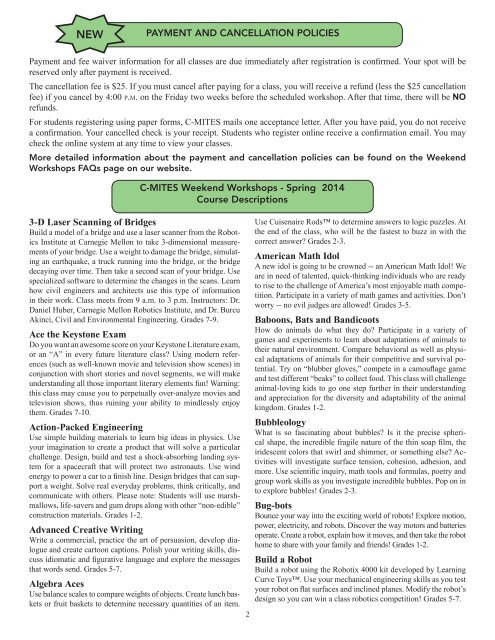

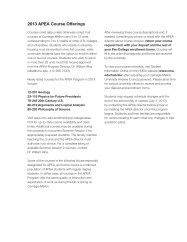
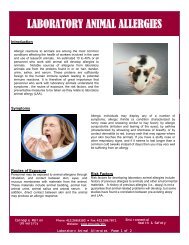
![Pittsburgh Neighborhoods [.pdf] - Carnegie Mellon University](https://img.yumpu.com/22011290/1/190x115/pittsburgh-neighborhoods-pdf-carnegie-mellon-university.jpg?quality=85)
![Curriculum Vitae [.pdf] - Carnegie Mellon University](https://img.yumpu.com/20737100/1/190x245/curriculum-vitae-pdf-carnegie-mellon-university.jpg?quality=85)
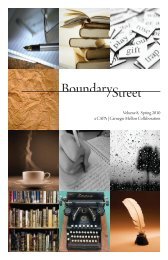
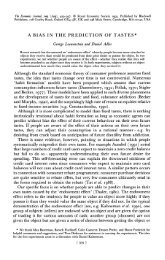
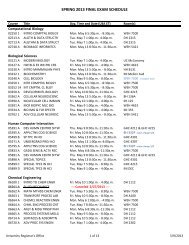
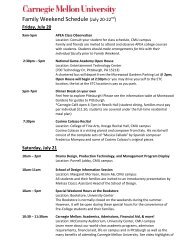
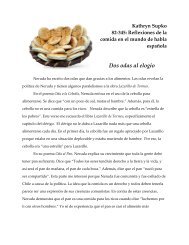


![May 2012 [.pdf] - Carnegie Mellon University](https://img.yumpu.com/12198417/1/190x253/may-2012-pdf-carnegie-mellon-university.jpg?quality=85)
